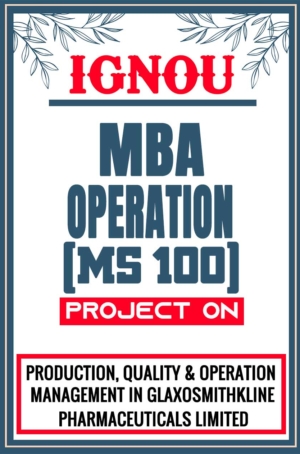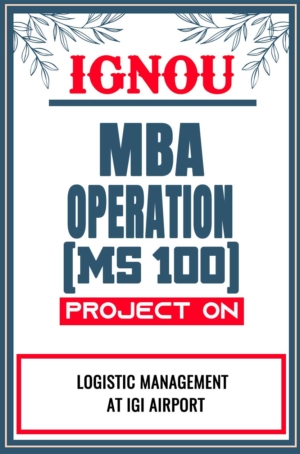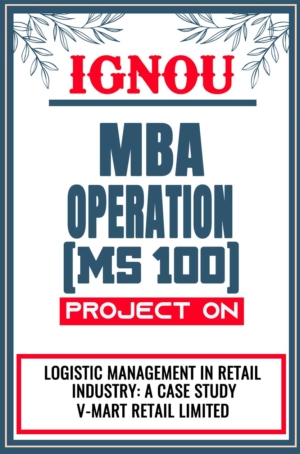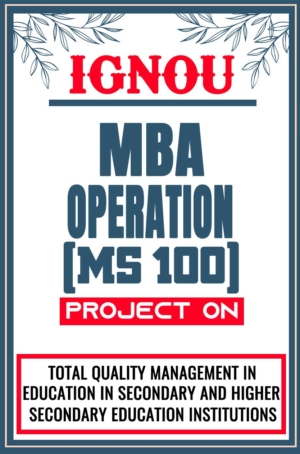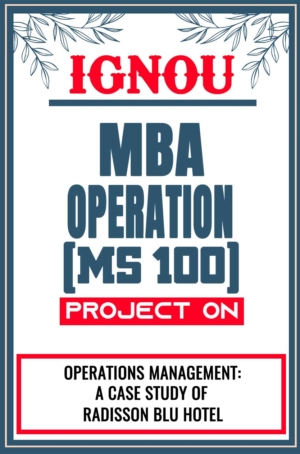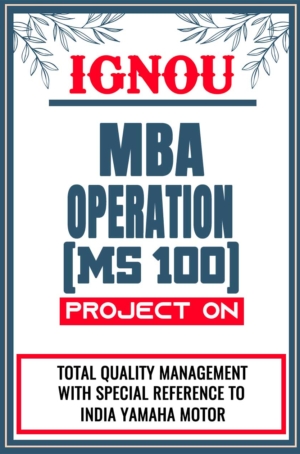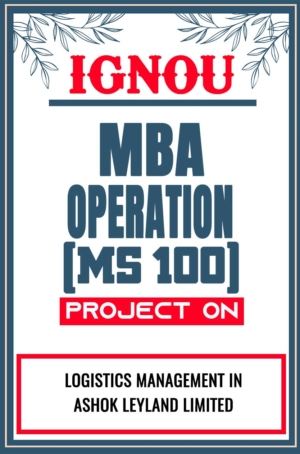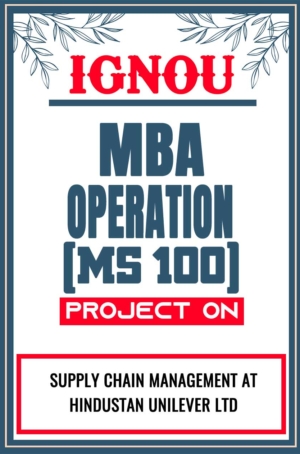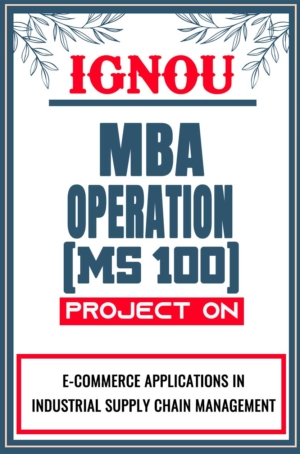Download IGNOU MBA Operations Management Project (MBAOM) for MMPP 1/MS 100
IGNOU MBA Operations Management Project (MBAOM) for MMPP 1/MS 100 is all about planning, coordinating, and managing an organization’s numerous productions and manufacturing services. An MBA in operations management or a concentration in a similar discipline should prepare students for entry into the business by providing them with the necessary skill set. The overarching goal of the IGNOU MBA Operation Synopsis is to examine the idea fully and thoroughly. It broadens one’s understanding of a subject and makes it easier to study and attain a goal. The newspaper, literature, and the internet may all provide us with knowledge about the subject. This gives students a general concept of the IGNOU MBA Operation Synopsis.
This IGNOU MBA Operations Management Project (MBAOM) for MMPP 1/MS 100 is an Online MBA program that blends the ease of learning from home with the academic rigor of a traditional school. Students can work on their IGNOU MBA Operations Management Project without having to be in class every day through IGNOU’s Online and Distance Education platform.
Whatsapp us to get the Personalized (Customized) or Readymade IGNOU MBA Operations Management Project Report and Synopsis (MBAOM) for MMPP 1/MS 100
WhatsApp Us
What should be included in the IGNOU MBA Operations Management Project proposal?
When preparing a project proposal for your IGNOU MBA in Operations Management, it is essential to include key elements that clearly outline your research plan and objectives. A well-structured project proposal typically includes the following sections:
1. Title Page:
- Project Title: A concise and descriptive title for your project.
- Student Details: Your name, enrollment number, and contact information.
- Course Details: Course name (MBA in Operations Management), code, and the academic term.
- Guide Details: Name and designation of your project guide.
2. Introduction:
- Background: Provide context for the project by briefly discussing the broader area of study.
- Problem Statement: Clearly define the problem or issue you intend to address through your project.
- Objectives: List the specific objectives of your research. These should be clear, achievable, and directly related to the problem statement.
3. Literature Review:
- Summary of Relevant Research: Summarize existing literature related to your topic. Highlight key findings, methodologies, and gaps in the research.
- Research Gap: Identify the gap in the existing literature that your project aims to fill.
4. Research Methodology:
- Research Design: Describe the overall research design (e.g., qualitative, quantitative, or mixed-methods).
- Data Collection Methods: Explain how you will collect data (e.g., surveys, interviews, observations, secondary data).
- Sampling Technique: Describe the sampling method and sample size, if applicable.
- Data Analysis Methods: Detail the techniques and tools you will use to analyze the collected data.
5. Scope and Significance:
- Scope: Define the boundaries and scope of your research. Specify what will and will not be covered in your study.
- Significance: Explain the importance of your project. Discuss the potential impact and relevance of your findings to the field of Operations Management.
6. Expected Outcomes:
- Results: Outline the expected results of your research. What do you hope to discover or demonstrate?
- Implications: Discuss the potential practical and theoretical implications of your findings.
7. Timeline:
- Schedule: Provide a detailed timeline for your project, including key milestones such as data collection, analysis, and report writing.
- Deadlines: Specify deadlines for each phase of the project to ensure timely completion.
8. Resources Required:
- Materials and Tools: List any resources, tools, or materials needed to complete your project.
- Budget (if applicable): Include a budget if there are any costs associated with your research.
9. References:
- Bibliography: Include a list of references and sources cited in your proposal. Follow a consistent citation style (e.g., APA, MLA).
10. Appendices (if necessary):
- Additional Information: Attach any additional information, such as survey questionnaires, interview guides, or detailed data collection plans, as appendices.
When should you start working on your IGNOU MBA Operations Management Project (MBAOM) for MMPP 1/MS 100?
There’s no fixed starting point for working on your MBA Operations Management project. However, here’s a breakdown of some factors to consider when deciding when to begin:
Project Timeline:
- A typical IGNOU MBA program lasts 2 years, with the project being a significant component.
- Completing a good quality project requires sufficient time for research, data collection, analysis, and report writing.
Registration and Synopsis Approval:
- You can’t officially begin project work until your project synopsis is approved by IGNOU.
- Submitting the synopsis early allows you to potentially start working on the project sooner.
Your Learning Pace:
- Consider your personal learning style and pace. Some students prefer to work on the project alongside their coursework, while others might prefer to focus on coursework first and dedicate later semesters solely to the project.
Project Guide Availability:
- Once your synopsis is approved, you’ll be assigned a project guide. Their availability for consultation could also influence your starting point.
Here are some general recommendations:
- Start Exploring Topics Early: You can begin researching potential project topics even before your synopsis submission. This gives you a head start and allows you to refine your ideas.
- Aim for Mid-Semester or Later: Consider starting the actual project work (data collection, analysis) in the second half of a semester or during subsequent semesters after your synopsis approval. This ensures you have a solid foundation in the core MBA and operations management concepts before diving into your research.
How do you select a suitable MBA Operations project topic?
Choose a topic that is relevant to the field of Operations Management and aligns with your interests and career goals. Ensure the topic is feasible in terms of data availability and research scope. Discuss potential topics with your project guide for approval.
Sample for the IGNOU MBA Operations Management Project (MBAOM) for MMPP 1/MS 100
- Logistics Management in Retail Industry in D-Mart in Xyz City
- Supply Chain Management Practices in Retailing: A Consumer Perception Study
- Total Quality Management Development in Pharmaceutical Company: A Case of Sun Pharmaceutical Industries Limited
- Concept of Operation Management on Service Delivery at Itc Hotels Limited
- A Study on Production Planning and Quality Control Effectiveness at Xyz Company
- Value Supply Chain Management in Imperial Auto Industries Limited
What is the duration of the IGNOU MBA Operations Management Project?
The MBA program in Operations Management at IGNOU lasts for at least two years and no more than five years. This length of time gives students the freedom to finish the program at their own pace, while still managing other obligations.
What is the course structure of the IGNOU MBA Operations Management Project?
The MBA in Operations Management at IGNOU follows a structured curriculum with a mix of core and specialization courses. Here’s a breakdown:
- Total Courses: 28
- Core Courses (19): These courses form the foundation of business administration and are common across all MBA specializations at IGNOU. They cover areas like management principles, accounting, marketing, human resource management, and financial management.
- Specialization Courses (8): These courses delve specifically into operations management. They equip you with knowledge and skills in areas like:
- Production and Operations Management
- Supply Chain Management
- Operations Research
- Quality Management
- Logistics Management
- Materials Management
- Enterprise Resource Planning (ERP)
(There might be one additional course depending on the program update)
- Project Course (1): This is a crucial component (equivalent to two courses) where you’ll undertake a research project in operations management. You can choose from research studies, inter-organizational studies, or field studies to apply your theoretical knowledge to a real-world scenario.
- Course Load: You’ll typically take 7 courses per semester.
How do you receive study materials for your MBA courses?
IGNOU provides study materials for your MBA in Operations Management courses through a variety of resources, all accessible free of cost! Here’s how you can get them:
1. eGyanKosh:
- This is IGNOU’s online repository for self-learning materials (SLMs).
- SLMs are specially prepared course materials designed for distance education.
- To access them, you’ll need to register for an account on the eGyanKosh website: [eGyanKosh ON Indira Gandhi National Open University egyankosh.ac.in]
2. IGNOU Website:
- IGNOU sometimes makes study materials available for download directly from their website.
- Check the program details or student portal of your enrolled MBA specialization for any downloadable materials.
3. IGNOU Printed Material:
- While the primary mode of study material delivery is digital, IGNOU may also offer printed course materials for an additional cost.
- This information is usually available during the registration process or through IGNOU regional centers.
Who can you contact for academic support?
You can contact your assigned academic counselor at your study center or your project guide for academic support. Additionally, IGNOU provides an online support system for queries.
What types of data can use for project?
In IGNOU MBA in Operations Management project, you can use various types of data to support your research. These data types can be broadly categorized into primary and secondary data.
1. Primary Data:
Primary data refers to data that you collect firsthand specifically for your research project. This data is original and tailored to your research needs.
Surveys and Questionnaires:
- Design surveys or questionnaires to gather data directly from respondents. This method is useful for collecting quantitative data on specific variables.
- Example: Conduct a survey to understand the inventory management practices of manufacturing firms.
Interviews:
- Conduct structured, semi-structured, or unstructured interviews with individuals or experts in the field. Interviews provide in-depth qualitative insights.
- Example: Interview operations managers to gain insights into challenges faced in supply chain management.
Observations:
- Observe processes, behaviors, or phenomena in their natural setting. This method is particularly useful for collecting qualitative data.
- Example: Observe the workflow on a manufacturing floor to identify bottlenecks and inefficiencies.
Experiments:
- Conduct experiments to test hypotheses in controlled settings. This method helps establish cause-and-effect relationships.
- Example: Implement and monitor the impact of a new inventory management system in a controlled environment.
2. Secondary Data:
Secondary data refers to data that has already been collected, processed, and published by others. This data is readily available and can be used to complement your primary data.
Academic Journals and Articles:
- Utilize peer-reviewed journals and articles for existing research and theoretical frameworks relevant to your topic.
- Example: Review academic articles on lean manufacturing techniques and their impact on operational efficiency.
Books and Reports:
- Use books, industry reports, and white papers for comprehensive information and detailed analyses on specific subjects.
- Example: Refer to industry reports on supply chain trends and logistics management.
Company Records and Databases:
- Access company records, internal reports, and databases to gather historical data and performance metrics.
- Example: Analyze past inventory data from company records to identify patterns and trends.
Government and Industry Publications:
- Refer to government publications, industry statistics, and market research reports for macro-level data.
- Example: Use data from government reports on manufacturing sector performance.
Online Resources:
- Utilize credible online databases and websites for up-to-date information and statistics.
- Example: Access databases like Statista or government websites for recent data on production and operations metrics.
What should you prepare for the viva voce?
Here’s what you can prepare for to ace the viva voce of your IGNOU MBA Operations Management project:
Project Knowledge:
- In-Depth Understanding: Be thoroughly familiar with your project topic, research methodology, and key findings. Revisit your project report and ensure you can confidently explain every aspect.
- Data & Analysis: Be prepared to discuss the data you used, the analysis methods you employed, and how they support your conclusions. Practice explaining complex concepts in a clear and concise manner.
- Limitations & Future Research: Acknowledge any limitations of your study and be prepared to discuss potential avenues for future research related to your topic.
General Operations Management Knowledge:
- Core Concepts: Refresh your understanding of core operations management concepts covered in your coursework. This showcases a broader knowledge base beyond just your project.
- Current Trends: Be aware of current trends and developments in operations management. Briefly discuss how these trends might be relevant to your project or the chosen field of study.
Presentation Skills:
- Clear Communication: Practice presenting your project findings in a clear, concise, and organized manner. Speak confidently and avoid jargon.
- Visual Aids: Consider using visuals like charts, graphs, or diagrams to effectively present your data and analysis.
- Professional Demeanor: Dress professionally and maintain a positive and enthusiastic attitude during the viva voce.
Ready to get your IGNOU MBA Operations Management Project (MBAOM) for MMPP 1/MS 100
- Call us or WhatsApp us at: 9958947060, 9354637830
- Visit: SHRICHAKRADHAR.COM
Check the topics and get downloaded it
Search the relevant topic below and download the readymade IGNOU MBA Operation Project Report & IGNOU MBA Operation Synopsis
Note: These are example IGNOU MBA Operation Project Synopsis Reports that are already written so that students can learn how to write them. A lot of students might think about getting them. IGNOU doesn’t accept projects that have already been turned in by other students. If you want a project that has never been turned in by another student and that we promise will be approved, WhatsApp us at 9958947060 and include the topic of your project.
-
Sale!

-
Sale!

IGNOU MBA Operation Project (MS 100) Synopsis/Proposal & Project Report/Dissertation in Soft-Copy (Sample-2)
Original price was: ₹499.00.₹149.00Current price is: ₹149.00. -
Sale!

IGNOU MBA Operation Project (MS 100) Synopsis/Proposal & Project Report/Dissertation in Soft-Copy (Sample-3)
Original price was: ₹499.00.₹149.00Current price is: ₹149.00. -
Sale!

IGNOU MBA Operation Project (MS 100) Synopsis/Proposal & Project Report/Dissertation in Soft-Copy (Sample-4)
Original price was: ₹499.00.₹149.00Current price is: ₹149.00. -
Sale!

IGNOU MBA Operation Project (MS 100) Synopsis/Proposal & Project Report/Dissertation in Soft-Copy (Sample-5)
Original price was: ₹499.00.₹149.00Current price is: ₹149.00. -
Sale!

IGNOU MBA Operation Project (MS 100) Synopsis/Proposal & Project Report/Dissertation in Soft-Copy (Sample-6)
Original price was: ₹499.00.₹149.00Current price is: ₹149.00. -
Sale!

IGNOU MBA Operation Project (MS 100) Synopsis/Proposal & Project Report/Dissertation in Soft-Copy (Sample-7)
Original price was: ₹499.00.₹149.00Current price is: ₹149.00. -
Sale!

IGNOU MBA Operation Project (MS 100) Synopsis/Proposal & Project Report/Dissertation in Soft-Copy (Sample-8)
Original price was: ₹499.00.₹149.00Current price is: ₹149.00. -
Sale!

IGNOU MBA Operation Project (MS 100) Synopsis/Proposal & Project Report/Dissertation in Soft-Copy (Sample-9)
Original price was: ₹499.00.₹149.00Current price is: ₹149.00.

